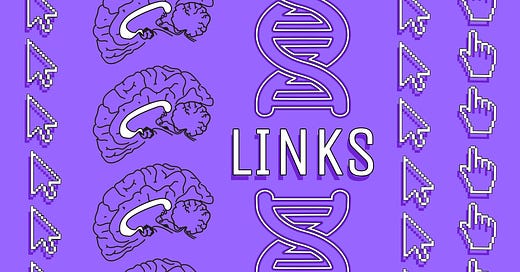LINKS - April 3rd, 2024
Welcome to LINKS — my attempt to provide Rhapsody readers with five interesting stories that tell us something about what it means to be human . LINKS is published every Wednesday. Have a link you want to share? Drop it in the comments.
Gas Trapped in Antarctic Ice Recorded the Mass Death of 56 Million People
By Meg St-Esprit, Atlas Obscura
“This massive reduction in human population was recorded in Antarctica, says King. Places Indigenous people once lived, worked, and farmed were abandoned, and the fabric of the planet was altered.
“‘We know that forests absorb carbon dioxide, thus reducing the amount of carbon dioxide in the atmosphere. So when there was a large population decline due to epidemics, a lot of natural forest could grow back over previous agricultural land.” The presence of more forested land meant more CO2 was absorbed by those plants, thus reducing carbon dioxide levels across the world. ‘This change in the atmosphere is recorded in our ice bubbles,’ says King.”
Eclipse Psychology: When the Sun and Moon Align, So Do We
By Katie Weeman, Scientific American
“This connectivity ties into a sociological concept known as ‘collective effervescence,’ Russo and Goldy say. When groups of humans come together over a shared experience, the energy is greater than the sum of its parts. If you’ve ever been to a large concert or sporting event, you’ve felt the electricity generated by a hive of humans. It magnifies our emotions.”
‘Lavender’: The AI machine directing Israel’s bombing spree in Gaza
By Yuval Abraham, +972 Magazine
“The Lavender software analyzes information collected on most of the 2.3 million residents of the Gaza Strip through a system of mass surveillance, then assesses and ranks the likelihood that each particular person is active in the military wing of Hamas or PIJ. According to sources, the machine gives almost every single person in Gaza a rating from 1 to 100, expressing how likely it is that they are a militant.”
Steve Buscemi Reveals Why His New Film Listens in on a Warmline
By Gary Drevitch, Psychology Today
“Steve Buscemi's new film, The Listener, takes viewers inside the home of a helpline volunteer, played by Tessa Thompson, during an intense overnight shift. Thompson's character, Beth, who is the only person viewers see, fields calls from a range of individuals (voiced by Rebecca Hall, Alia Shawkat, Ricky Velez and others) grappling with loneliness, anxiety, mental illness, and suicidal ideation but sharing a need to have someone listen to them—preferably someone from outside ‘the system.’”
Our tools shape our selves
By Bryan Norton, aeon
“According to Stiegler, technics – the making and use of technology, in the broadest sense – is what makes us human. Our unique way of existing in the world, as distinct from other species, is defined by the experiences and knowledge our tools make possible, whether that is a state-of-the-art brain-computer interface such as Neuralink, or a prehistoric flint axe used to clear a forest. But don’t be mistaken: ‘technics’ is not simply another word for ‘technology’. As Martin Heidegger wrote in his essay ‘The Question Concerning Technology’ (1954), which used the German term Technik instead of Technologie in the original title: the ‘essence of technology is by no means anything technological.’ This aligns with the history of the word: the etymology of ‘technics’ leads us back to something like the ancient Greek term for art – technē. The essence of technology, then, is not found in a device, such as the one you are using to read this essay. It is an open-ended creative process, a relationship with our tools and the world.”




